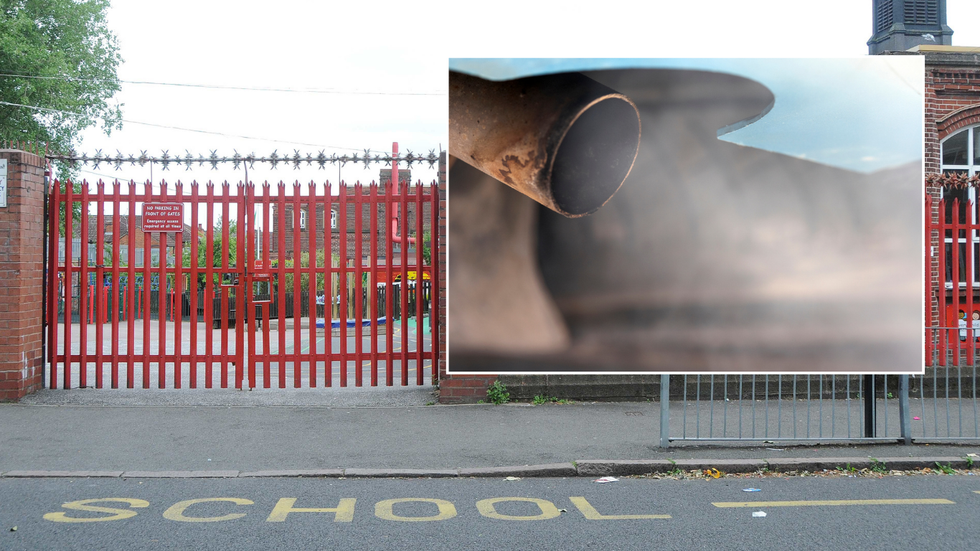WATCH: ECO-MEDDLING WAR on drivers: Penalties 'SURGE' for drivers across the UK
GB NEWS
Southend-on-Sea City Council has proposed new fines for drivers leaving engines on while stationary
Don't Miss
Most Read
Trending on GB News
Drivers have been warned of new plans set to be introduced which could see thousands of motorists fined for leaving engines on during school drop-offs.
The warning comes after Southend-on-Sea City Council proposed tighter rules for petrol and diesel drivers to help tackle air pollution within the region.
Under the proposals, parents can be fined by the council for leaving their engines on while dropping children off at school.
The plans unveiled in the council’s Air Quality Action Plan aim to address harmful emissions released from petrol and diesel cars along the A127 from Bell Junction to Victoria Avenue.
Do you have a story you'd like to share? Get in touch by emailingmotoring@gbnews.uk

Drivers can be fined for leaving engines on while dropping children off to school under new plans
GETTY
The council document detailed: “Engine idling (leaving your vehicle engine running while not moving) is a big source of local air pollution. It contributes to poor air quality, which then damages people's health.
“Cough! Cough! Engine Off! Our anti-idling campaign will help us all play our part in reducing air pollution. We want to make people think about the importance of clean air and the impact that air pollution has on our health.”
The need to improve air pollution comes after research found that over 30,000 deaths a year nationally are linked to air pollution with children at risk of suffering life-long health problems.
The council has taken a stronger stance on reducing idling outside schools, nurseries and preschools as well as at traffic lights, where possible.
Drivers who deliberately leave car engines on while stationary can also face severe legal consequences. Stationary idling is a crime under Section 42 of the Road Traffic Act 1988 and could see drivers slapped with £20 penalties, increasing to £40 if paid late. Idling also breaks Rule 123 of the Highway Code, which states: “You must not leave a vehicle’s engine running unnecessarily while that vehicle is stationary on a public road.”
Lydia Hyde, councillor responsible for climate, environment and waste told GB News: "We have an anti-idling campaign around our schools. Children are much more affected by pollution in their young lungs, and so this campaign is crucial for protecting the children's health by reducing exposure.
"While much of the campaign focuses on increasing awareness on the effects of exhaust fumes, including signage around the schools, we do have the power to issue fines where necessary for those that continue to flout the rules."
On top of tackling air pollution, the council will also look to improve public transport as well as walking and cycling through its "Green City Action Plan".
Jon Fuller, spokesperson for South East Essex Friends of the Earth added: "I'm concerned that the Bell Junction action plan is not sufficiently robust.
"We welcome proposals to upgrade the bus fleet and deter idling of car engines. We also welcome wider policies to encourage walking and cycling. But there is a desperate need to embrace car reduction measures. We need to embrace eco-tourism, encouraging day trippers to get on the trains and buses."
Offering advice to drivers on how to reduce air pollution, the council suggested that whenever a vehicle is parked or stationary, “it is less polluting to turn your engine off and restart it after a minute (or longer) than to leave your engine running".
Other advice includes using modern batteries which require less engine running time to work and can be more economical for drivers.
LATEST DEVELOPMENTS:
- Thousands of drivers risk £2,500 fine in stop and searches amid increase in rulebreakers - ‘Only way forward’
- Millions of motorists demand new restrictions on young drivers with calls for legal action - ‘Necessary’
- Major new petrol station changes launching this month could see unleaded and diesel prices rise

Under Rule 123 of the Highway Code drivers must not leave 'vehicle’s engine running unnecessarily'
GETTYFor drivers who primarily use the engine for the heater function, the council explained that it can take up to an hour for an engine to cool down. It added: "Turning off your engine but keeping the ignition on and the fan blowing will provide warm air for some time."
According to new research by University College Cork, if drivers stopped idling for three minutes every day of the year, this could help reduce carbon dioxide emissions by 1.4 million tonnes annually, the equivalent of taking 320,000 cars off the road.








